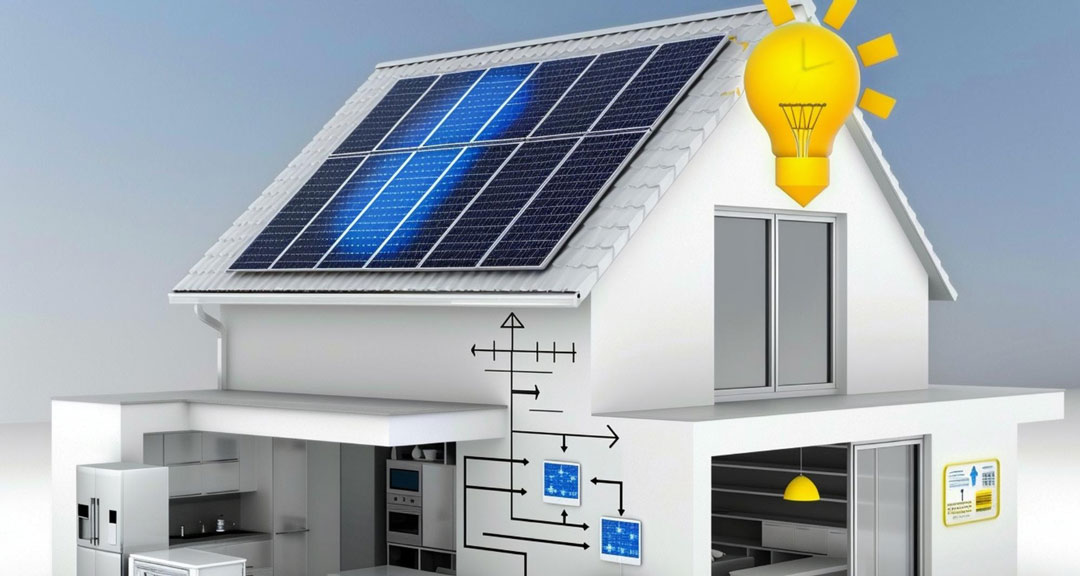Have you noticed the uptick of people and pundits talking about solar energy these last few years? You aren’t alone. Renewable energy sources, like solar power, have gained popularity due to energy security becoming a more significant priority for businesses, the government, and average Americans. As the number of solar panels installed across the United States increases, you may wonder, “How does solar work?” And, more importantly, how does solar energy save you money?
Solar energy can seem like something out of science fiction, but it’s relatively simple to unpack. Let’s look at the mechanics of solar panels, how they work, and how they can save so much money.
[su_box title=”RELATED:” box_color=”#4AC1E0″ title_color=”#000000″]Solar 101: How Many Solar Panels Can I Fit On My Roof? [/su_box]
So, How Does Solar Work?
Here’s a quick overview of how solar works at a basic level:
Let’s recap the information in that video: During the day, a solar energy system captures energy from the sun via photovoltaic (PV) cells in the panel. The captured energy creates electrical charges that move in response to an internal electric field and causes electricity to flow.
With the produced electricity, solar panels power all the devices you have in your home. If you’re using more energy than your panels can make, you can pull additional power from the grid. Your panels may also overproduce, so you can send the excess energy back to the grid to earn credit on your electricity bill. If you’re working with an excellent local solar installer, they’ll help you design a system that consistently overproduces and practically never underproduces.
How Do Solar Panels Work on Houses?
Solar panels work identically on houses as they do on the ground or in any other building. When a solar energy contractor designs a home solar system, they’ll use satellite imagery to determine the ideal location for your solar panels, ensuring they capture enough light to power your home. They’ll install solar panels on your house once they’ve finalized and approved a design.
The length of a solar panel installation will vary based on its size and complexity and any supply issues that may hinder the process. However, once the system is up and running, it’ll work as shown in the video: Your system captures the light from the sun, converts it into energy, then produces electricity to power your home.
Do Solar Panels Work On Cloudy Days?
Yes, solar panels work on cloudy days. The PV Panels can use direct or indirect sunlight to produce electricity, so your meetings will continue to work when it’s overcast or rainy. Rain can clean solar panels by washing away dust and dirt accumulated on them, making your meetings more efficient. However, solar panels will work best on bright, sunny days.
Are Solar Panels Becoming More Common?
Solar panels are becoming more common worldwide as governments, businesses, and individuals move away from fossil fuels. Solar isn’t the only green energy becoming more common, either. Renewables are the fastest-growing energy source in the United States, increasing 90% from 2000 to 2020. The cost of solar panels has fallen significantly over the past decade, so the trend will likely continue as solar becomes a more affordable solution for homeowners.
Solar is an excellent solution for individuals, but solar systems are also being built to scale for entire cities, enterprise buildings, and more. The solar arrays that power those locations are called solar farms, and they’re far more significant than the residential systems you’ll see while walking around your neighborhood.
How Do Solar Farms Work?
When you see a solar farm, you’ll probably be taken aback by its sheer size and scale. Unlike home solar panels, solar farm panels are massive, which allows them to capture and convert more energy. The most notable solar farm project in the United States is the Ivanpah Solar Electric Generating System, which is located in the Mojave desert. The monolithic system has a total capacity of 400 megawatts — or 400,000 kilowatts — daily. For reference, the average home only uses about 10,000 kilowatts per year. Supplementing solar farms with home solar systems will be a central part of renewable energy strategies in the future.
That’s the core of how solar panels work, though we have plenty of other resources on the topic. Check out our solar energy blog if you’d like to know more about the solar industry. If you’re interested in going solar yourself, Purelight Power can help. Take our roof qualification survey today, and you’ll know in minutes whether or not solar is a good fit for your home.
[su_box title=”MORE:” box_color=”#4AC1E0″ title_color=”#000000″]Solar 101: Do Solar Panels Work in Winter?[/su_box]




